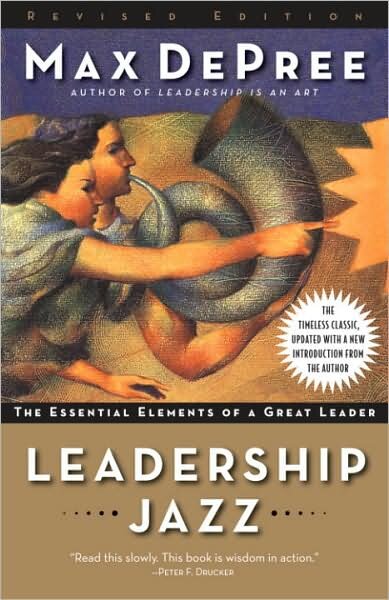Max De Pree, Leadership Jazz: The Essential Elements of a Great Leader. Revised Edition. Doubleday Business, 2008.
Referenced in: Empowering Leadership
LifeandLeadership.com Summary
Max De Pree is one of the most respected authors on transformational, empowering and servant leadership philosophies. It is the second of De Pree’s contributions to this genre, preceded by Leadership Is An Art and followed by Leading Without Power.
In stories based on Depree’s decades of experience as the top executive of Herman Miller, he compares servant leadership to the task of conducting a jazz ensemble:
“One way to think about leadership is to consider a jazz band. Jazz-band leaders must choose the music, find the right musicians, and perform in public. But the effect of the performance depends on so many things – the environment, the volunteers in the band, the need for everybody to perform as individuals and as a group, the absolute dependence of the leader on the members of the band, the need of the leader for the followers to play well.”
He says, “Jazz, like leadership, combines the unpredictability of the future with the gifts of individuals.” It is not a book of techniques, but addresses more of the premises upon which a leader bases his interaction with the organization, the continuous renewal the leader brings, and the spirit he projects. He speaks of the moral currencies of leadership such as integrity, creativity, presence, curiosity, intellectual energy, vulnerability, people awareness, courage, and humor. He walks insightfully amid the polarities of leadership such as unity and diversity, ambiguity and clarity, change and predictability, and the interconnections of future-present-past. His list, the “The Attributes of Leadership: A Checklist” is valuable enough by itself. Here are just a few gems found in this book (quotes taken from 1993 version):
Organizational Renewal – “Betrayal is closely linked to the idea of entropy, the tendency of everything to deteriorate. Both have a way of sneaking up on us. Both hover constantly over organizations waiting for the slightest slackening of our vigilance.” (34)
Human Potential – From a leader’s perspective, the most serious betrayal has to do with thwarting human potential, with quenching the spirit, with failing to deal equitably with each other as human beings. (34) “The mystery around potential is so great that even the most perceptive of us cannot look at a person and decide for certain whether or not she’ll be good at this or that, whether or not she’ll become a sales manager or vice president – or even the best shortstop you ever saw. We should really be in awe of human potential. (53)
Supportive relationships – Not to choose beauty and harmony puts one squarely in the ranks of the mediocre and endows one with all the characteristics that word implies. (89)
Creativity – A leader protects unusual persons from the bureaucracy and legalism so ensconced in our organizations. A leader remains vulnerable to real surprise and to true quality. (96-97)
Empowerment – Leaders learn how to become abandoned to the needs of the followers. The needs of the followers can never be at odds with the true interests of a leader. (136)
Delegation (def.) – to separate the issue from oneself and to abandon ourselves to the gifts that other people bring to the game. (157)
Value of amateurs – I’ve often asked myself, “Are the poorest sandlot baseball players chosen last because they commit so many errors? Or do they commit errors because they’re chosen last?” (198)
Servant Leadership – “Good leadership includes teaching and learning, building relationships and influencing people, as opposed to exercising one’s power” (p. 177)
From the Publisher
Since it was first published to wide acclaim in 1992, the bestselling Leadership Jazz has firmly placed itself among the great business classics. Former President Bill Clinton called it “astonishing,” and the late Peter Drucker advised, “Read this slowly. This book is wisdom in action.”
Now updated for first time in well over a decade, this powerful book reveals why today, more than ever, leadership is more an art than a science. Today’s best leaders, De Pree says, are attuned to the needs and ideas of their followers, and even step aside at times to be followers themselves. Filled with insightful stories from De Pree’s experience as the chairman of Herman Miller and from people he’s met along the way, Leadership Jazz reveals how to:
- Hold people accountable and give them space to reach their potential
- See the needs of employees and those of the company as the same
- Inspire change and innovation
- Work effectively with creative people
Complete with an extensive new introduction from De Pree on why his philosophy is more relevant now than ever before, Leadership Jazz gives you an entirely new way to look at the difficult job of leader.
About the Author
MAX DE PREE is chairman emeritus of Herman Miller, Inc., the primary innovator in the furniture business for sixty years and regularly included as one of Fortune’s 25 Most Admired Companies in the United States. The author of the bestselling Leadership Jazz, as well as Leading Without Power, Called to Serve, and Dear Zoe, De Pree has been mentoring emerging leaders in both the profit and non-profit sectors for more than twenty years, and was elected by Fortune magazine to the National Business Hall of Fame.
***For additional information on this resource, including reviews, click the bookstore links. Check the reference at page top or the links below for resource guides on related topics.***
Related Areas
See Other Resources on Leadership:
See Resources on Over 100 Areas of Ministry Leadership:


